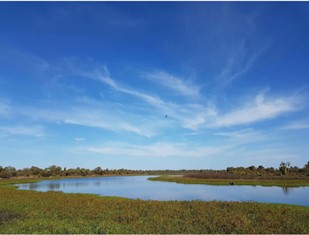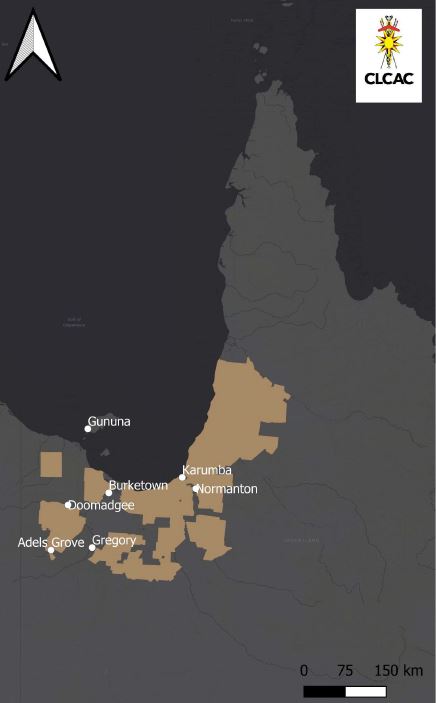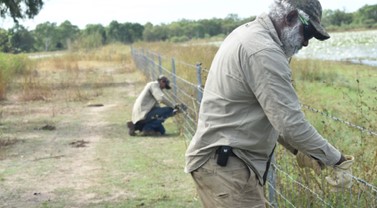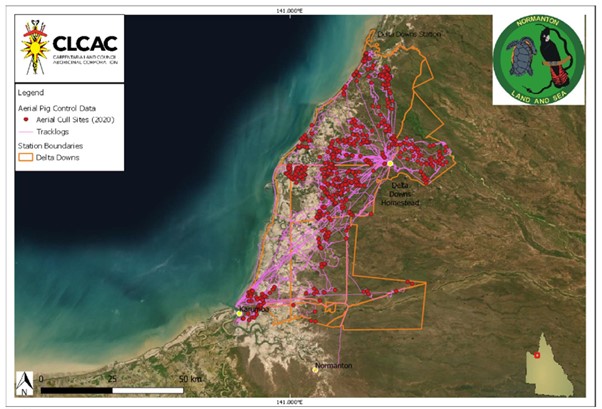The National Feral Pig Action Plan
Carpentaria Land Council Aboriginal Corporation, Queensland
Carpentaria Land Council Aboriginal Corporation (CLCAC) was incorporated under the Aboriginal Councils and Associations Act in April 1984 in Burketown, Queensland. It is a community-based organisation to represent, protect and secure the rights and interests of Aboriginal people in the Gulf of Carpentaria.
The members of the CLCAC are drawn from nine language groups whose traditional lands and waters are located in the southern Gulf of Carpentaria.
These are: Waanyi, Gkuthaarn, Kurtijar, Kukatj, Yangkaal, Kaiadilt, Lardil, Gangalidda and Garawa.

What's been achieved
- Accredited feral pig management training is delivered internally within CLCAC to build capacity and capability of Indigenous Rangers and ensure that activities can be managed and conducted locally.
- Recognition of the leadership position of Indigenous Rangers managing Country.
- Overall, CLCAC’s feral pig management program has removed approximately 103,000 pigs in the lower Gulf region since 2011.
- Over recent years, feral pig numbers in the lower Gulf region have been reduced by drought, floods, and cross-landscape culling.
Background of Program
Feral pig management is one of the highest priorities of the CLCAC’s Indigenous Ranger program. The Rangers have been undertaking aerial culling of pigs for over ten years.
The CLCAC’s vertebrate pest control program has been successful in the strategic management of feral animals, including the removal of tens of thousands of feral pigs in the Normanton region in recent years.
Pigs were originally culled each year initially in close collaboration with the Cook Shire’s Cape York Weeds and Feral Animal Program.
In 2015, a more systematic approach to aerial culling was implemented as part of the Nest to Ocean program, where pigs were culled to reduce depredation of marine turtle nests and eggs.
The landscape-scale, nil tenure approach being applied by the CLCAC plays an important part in suppressing population recovery and movement of pigs between properties in the lower Gulf region.
Property-based approaches to feral pig management can be ineffective in the lower Gulf due to the extensive distribution of pigs throughout the region and mobility across station boundaries. This program meets these challenges by conducting follow-up shoots on properties previously culled and extending the coverage to new pastoral stations that were not previously included in CLCAC operations.
The Carpentaria LCAC internally delivers accredited training to enable Rangers to conduct pest management activities on their Country.
Four Rangers have been accredited to conduct aerial shooting, including two Indigenous Ranger Coordinators in Burketown and Normanton. These shooters also have the capability to undertake fixed wing population surveys. Training for this is also delivered by the Rangers.
Demonstrated expertise and effectiveness in feral pig management has resulted in the Normanton Ranger group securing ongoing contracts with both the Burketown and Carpentaria Shire Councils to deliver their bi-annual aerial baiting program to more than 30 pastoral leases to deliver the Councils’ vertebrate pest management strategy.

The CLCAC is committed to broadening their area of operations to cover both Indigenous managed and/or owned Country as well as non-Indigenous pastoral properties in the region, with services provided through their Indigenous Ranger team.
Partnerships with local pastoralists continue to be strengthened to develop and deliver long term coordinated feral pig management for the region.
Activities being conducted
The CLCAC’s feral pig management strategy involves best practice management being applied in an integrated way. The methods used are aerial culling, aerial baiting (with 1080), trapping (where viable), ground shooting, and construction of exclusion fencing of sites of significance (including wetlands). Ongoing monitoring of outcomes from control efforts is routinely conducted by Rangers.

In 2020, Northern Gulf Resource Management Group provided funding to CLCAC through the Queensland and Federal Governments’ Disaster Recovery Funding Arrangements to undertake aerial culling at a regional scale across Carpentaria Shire in the lower Gulf of Carpentaria. Areas where feral pigs were removed during this program are shown in the figure below.
All properties involved in the program provided considerable in-kind support by providing all fuel required, supporting helicopter time on a 50:50 basis with CLCAC, and providing accommodation and food for shooters and pilots.

The Normanton Rangers target feral pigs at two different periods during the dry season.
The months of May through to June are targeted when much of the country has dried off but the large, permanent and perennial swamps are still green and rich in abundant food sources.
The second targeted period is the later months, particularly October through November, when the extreme temperatures congregate feral pigs around the remaining on-ground water sources.
In addition to culling, the Normanton Rangers use fixed-wing surveys to inform and evaluate aerial pest animal management. Fixed-wing aerial surveys are an important component of large-scale pest animal management programs and provide a rapid technique to obtain abundance and distribution data for medium to large sized feral animals such as pigs and horses.
The Normanton Rangers conducted a fixed-wing aerial population survey on Delta Downs Station (which is owned and operated by Traditional Owners) immediately before any culling activity to determine the density of pigs per square kilometre and to identify the spatial distribution to assist with targeted culling operations.
A post-cull survey, scheduled to occur in 2021, will be used to quantify the effectiveness of the aerial culling at reducing pest animal numbers and inform future management actions.
Funding
Funding to support CLCAC’s feral pig management activities have been provided from a range of sources including:
- Caring for Country
- Nest to Ocean
- Ranger operational budgets
- Small State and Federal funding grants
- Considerable pastoralist investment
- CBIRS (Training Funds)
- Contract services
CLCAC considers that any funding for feral pig management must be regionally focussed and at catchment scale, with all neighbouring stakeholder organisations working cohesively together to reduce populations and their impacts.
Further Information
NFPAP feature article
Official page
Carpentaria Land Council Aboriginal Corporation – Official website
Social media
Carpentaria Land Council Aboriginal Corporation – Facebook page
Other resources
Carpentaria Land Council Aboriginal Corporation aerial control program – July 2022
Contact
Mark Hogno, CLCAC Land and Environment Coordinator, 07 4745 1556, mhogno@clcac.com.au
Figures and maps have been supplied by CLCAC.